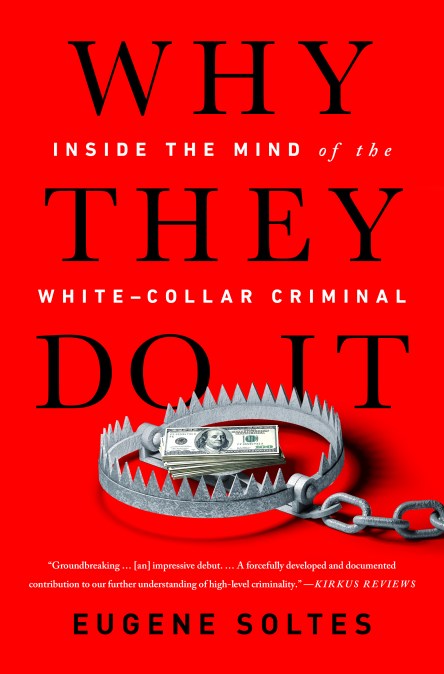Shopping Cart
Why They Do It
Inside the Mind of the White-Collar Criminal
Description
“This fascinating book reads like a fast-paced novel that details the motivations and consequences of white-collar crime.”―Arthur Levitt, former chairman of the US Securities and Exchange Commission
From financial fraud to Ponzi schemes, the failings of corporate titans are regular fixtures in the news. In Why They Do It, Harvard Business School professor Eugene Soltes draws from extensive personal interaction and correspondence with nearly fifty former executives, as well as the latest research in psychology, criminology, and economics, to investigate how once-celebrated executives become white-collar criminals. Never before have we been able to peer so deeply into the minds of the prominent perpetrators of white-collar crime.
From financial fraud to Ponzi schemes, the failings of corporate titans are regular fixtures in the news. In Why They Do It, Harvard Business School professor Eugene Soltes draws from extensive personal interaction and correspondence with nearly fifty former executives, as well as the latest research in psychology, criminology, and economics, to investigate how once-celebrated executives become white-collar criminals. Never before have we been able to peer so deeply into the minds of the prominent perpetrators of white-collar crime.
Newsletter Signup
By clicking ‘Sign Up,’ I acknowledge that I have read and agree to Hachette Book Group’s Privacy Policy and Terms of Use
Praise
“[Soltes] has done a great service with Why They Do It. Not only does he draw on psychological research to dissect the way white‑collar criminals think‑or fail to think‑before they act. But he also interviews several of the most famous white‑collar criminals of our time, among them, the corrupt lawyer Marc Dreier and the financial swindlers Allen Stanford and Bernie Madoff. He presents what he has found in a spirit of understanding rather than condemnation.”
—Wall Street Journal
“[Soltes] takes a unique approach, looking for the connections between what motivated these men ‑ and yes, they are all men ‑ and asking not what they did but why they did it....Soltes creates some fascinating portraits.”
—Washington Post
“This fascinating book reads like a fast-paced novel that details the motivations and consequences of white-collar crime.”
—Arthur Levitt, former chairman of the US Securities and Exchange Commission
“A landmark study of business gone wrong.”
—Andrew Lo, MIT School of Management
“A deep and important analysis of one of the most important and least studied problems of our times: corporate crime. But it is also a page turner.”
—Luigi Zingales, University of Chicago
“A rare, intimate, and fascinating glimpse into the series of decisions, each one mundane enough, that lead by steps to high crime. Leaves you wondering, could it happen to you?”
—John Coates, former trader and author of The Hour Between Dog and Wolf
—John Coates, former trader and author of The Hour Between Dog and Wolf
“Groundbreaking...[an] impressive debut...A forcefully developed and documented contribution to our further understanding of high‑level criminality in lightly regulated free markets.”
—Kirkus
